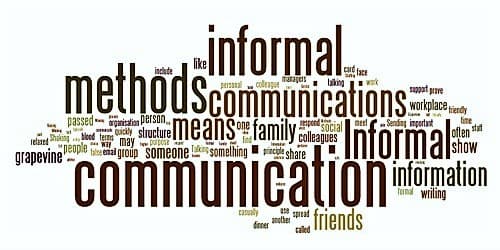Disadvantages or Limitations of Informal Communication
In practice, informal communication enjoys many advantages or merits. Yet it cannot be said that it is free from any flaw or limitation. This communication arises out of the needs of employees to exchange their views, which cannot be done through formal channels. In the following, the major Disadvantages or limitations are discussed:
- Distortion of the message
The most striking drawback of informal communication is that it transmits distorted information. These communication networks do not follow any sort of rules, absolute method or ways. Informal communication does not follow any set rule or formality. So it can convey any sort of information to any individual without any admiration or fear. For this reason, people transmit distorted information through informal channels without any fear, hesitation or responsibility. It may spread false or distorted news which might sometimes seem detrimental even to the employees.
- Creating misunderstanding
Lack of conduct, confidence, decency, and rules cause misunderstanding in informal communication. In many cases, this communication creates conflicts and misunderstandings in the organization. As a result, there may be disagreement between employees. Because, informal channels of communication transmit false, distorted and wrong information. Under this system, usually, the employees do not obey the formal approval system.
- Lack of secrecy
Informal communication also suffers a hoot secrecy problem. Everybody can liberally cooperate as there are no boundaries or rules. Since it follows no rule and revision, important mitten of the organization is likely to be disclosed through it. Any undisclosed subject is likely to be flashed without any predicament or uncertainty. This might reason enormous harm to any organization.
- Providing partial information
Information released from such a communication network is generally partial. Since little attention is given at the time of exchanging information through the informal channel, only partial information reaches to the destination which gives no complete meaning. Most of the information received through this communication is unreliable and no significant conclusion can be taken on its basis.
- Spreading rumors
Most of the time, informal communication fabricates the actual facts and makes some flushed picture. Since informal communication is not any rule-bound, people try to use this channel to present the real fact colorfully or by mixing untrue matted. In this method, the miss-information or rumor extends quickly. This turns the real fact into a rumor and spreads that rumor quickly. The original information may be transformed into the wrong information.
- Damaging discipline
This sort of communication is subject to errors and mistakes because no officials rules or parameter operate in this case of this communication. By nature, informal patterns of communication are independent of the formal channel and do not follow the organization’s established chain of command. This communication is completely disorganized and it is not essential that information reaches the person concerned. As a result, indiscipline may appear in the whole organizational activities.
- Contradicting to formal information
In some cases, messages sent through the informal channel of communication may contradict or differ with that of formal information. Sometimes, mystification develops among the persons involved in informal communication. As a result, they may stay detach without any co-operation. This also creates conflict and misunderstanding among the people in the organization.
- Difficult to Control
This type of communication can manage sub-division or groups and subgroups in the workplace or organization. People concerned here do not maintain any rules and guideline as they depend on their own attitude. All these may obliterate the control of the particular authority.
- Lack of Resistance
As informal communication does not follow any established system, it is beyond any control. The organization has no instrument to resist its movement.
Form the above discussion we can draw the conclusion that since communication contains the above-stated limitations, it should be used with utmost care and caution.















